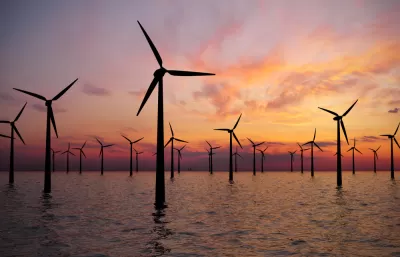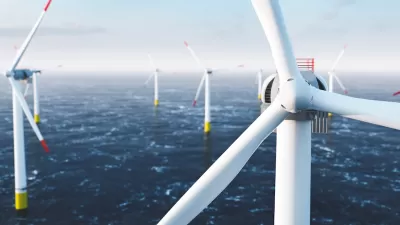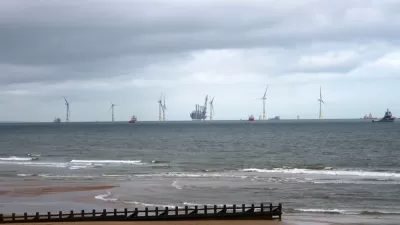States traditionally resistant to renewable energy are passing legislation to ease the way for offshore wind production as lawmakers realize the potential economic benefits to their states.

“The offshore wind industry, which produces little electricity today, is poised to grow exponentially in the coming years as long-awaited projects come online, and more waters are opened for leasing,” writes Alex Brown in Governing. While some states mandate certain amounts of offshore wind energy, Schulman writes, others have been reluctant to do so. Now, with the economic benefits of offshore wind becoming more apparent, some state legislators are hoping their states can cash in.
On the East Coast, “Eight states set goals or mandates that total 39 gigawatts of capacity by 2040. Many have invested in ports, workforce development, transmission infrastructure and manufacturing sectors.”
The article outlines recently passed or proposed laws that support offshore wind production, such as a Massachusetts bill that would establish an investment fund and a Maryland law that streamlines the process for renewable energy credits. On the West Coast, “Federal officials are expected to hold the first offshore wind lease sale in California waters this fall, and state regulators there have twice voted to allow the lease phase of projects to move forward.”
Even in the South, where energy interests have largely suppressed the development of renewable energy infrastructure, lawmakers hope to reverse that trend. “Louisiana legislators, for example, passed a law this year to allow for leasing of state waters in the Gulf of Mexico for offshore wind projects.”
FULL STORY: More States Back Offshore Wind, Citing Economic Potential

Alabama: Trump Terminates Settlements for Black Communities Harmed By Raw Sewage
Trump deemed the landmark civil rights agreement “illegal DEI and environmental justice policy.”

Study: Maui’s Plan to Convert Vacation Rentals to Long-Term Housing Could Cause Nearly $1 Billion Economic Loss
The plan would reduce visitor accommodation by 25% resulting in 1,900 jobs lost.

Planetizen Federal Action Tracker
A weekly monitor of how Trump’s orders and actions are impacting planners and planning in America.

Waymo Gets Permission to Map SF’s Market Street
If allowed to operate on the traffic-restricted street, Waymo’s autonomous taxis would have a leg up over ride-hailing competitors — and counter the city’s efforts to grow bike and pedestrian on the thoroughfare.

Parklet Symposium Highlights the Success of Shared Spaces
Parklets got a boost during the Covid-19 pandemic, when the concept was translated to outdoor dining programs that offered restaurants a lifeline during the shutdown.

Federal Homelessness Agency Places Entire Staff on Leave
The U.S. Interagency Council on Homelessness is the only federal agency dedicated to preventing and ending homelessness.
Urban Design for Planners 1: Software Tools
This six-course series explores essential urban design concepts using open source software and equips planners with the tools they need to participate fully in the urban design process.
Planning for Universal Design
Learn the tools for implementing Universal Design in planning regulations.
Caltrans
Smith Gee Studio
Institute for Housing and Urban Development Studies (IHS)
City of Grandview
Harvard GSD Executive Education
Toledo-Lucas County Plan Commissions
Salt Lake City
NYU Wagner Graduate School of Public Service





























